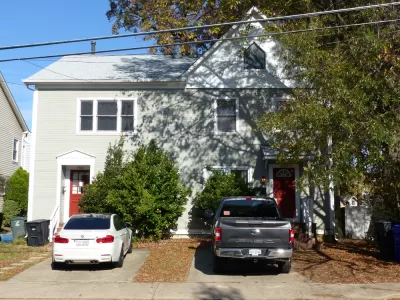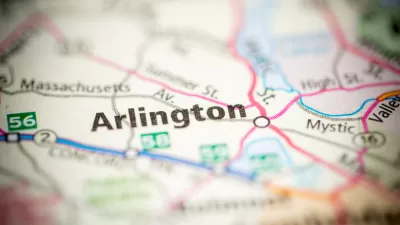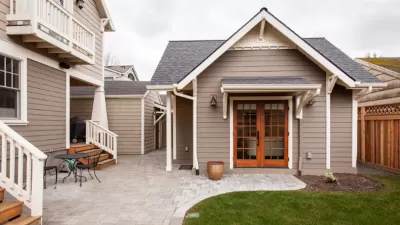New research suggests that missing middle housing could help make more affordable housing available to Arlington residents, particularly Black households historically blocked from homeownership in many neighborhoods.

A new report suggests that legalizing missing middle housing could help reverse the impacts of historical redlining and racial discrimination in housing in Arlington, writes Mavis Chan for ARLNow. The report comes as the city debates a Missing Middle Housing Study, which recommends permitting multifamily construction of up to eight units on single-family zoned lots.
“The report, which looked at local and state policy changes to address housing segregation in Virginia, pointed out that although Arlington did not adopt an explicit racial zoning ordinance, redlining and restrictive covenants resulted in most of the majority white areas permitting single-family detached housing only, thus raising the relative cost of homes in those areas.”
Opponents of increased density point out that the proposal would not make more affordable housing available to lower-income residents. “Officials expect households with an income between $108,000 and over $200,000 to be able to afford the new proposed housing types, according to a county report in April.” Supporters of the policy point out that there is a need for all types of housing, and that any new construction will ease the pressure on the housing market.
“Other policies the report recommended include providing financial support to formerly redlined neighborhoods as part of Arlington’s comprehensive plan, a guide the county uses to set priorities. The report also suggested updating zoning ordinances to encourage mixed-use buildings with higher density in commercial areas, using density bonuses and other affordable housing incentives, and focusing on home ownership like community land trusts.”
FULL STORY: Report highlighted by NAACP supports ‘missing middle’ as a response to local legacy of redlining

Alabama: Trump Terminates Settlements for Black Communities Harmed By Raw Sewage
Trump deemed the landmark civil rights agreement “illegal DEI and environmental justice policy.”

Study: Maui’s Plan to Convert Vacation Rentals to Long-Term Housing Could Cause Nearly $1 Billion Economic Loss
The plan would reduce visitor accommodation by 25% resulting in 1,900 jobs lost.

Why Should We Subsidize Public Transportation?
Many public transit agencies face financial stress due to rising costs, declining fare revenue, and declining subsidies. Transit advocates must provide a strong business case for increasing public transit funding.

Paris Bike Boom Leads to Steep Drop in Air Pollution
The French city’s air quality has improved dramatically in the past 20 years, coinciding with a growth in cycling.

Why Housing Costs More to Build in California Than in Texas
Hard costs like labor and materials combined with ‘soft’ costs such as permitting make building in the San Francisco Bay Area almost three times as costly as in Texas cities.

San Diego County Sees a Rise in Urban Coyotes
San Diego County experiences a rise in urban coyotes, as sightings become prevalent throughout its urban neighbourhoods and surrounding areas.
Urban Design for Planners 1: Software Tools
This six-course series explores essential urban design concepts using open source software and equips planners with the tools they need to participate fully in the urban design process.
Planning for Universal Design
Learn the tools for implementing Universal Design in planning regulations.
Smith Gee Studio
Alamo Area Metropolitan Planning Organization
City of Santa Clarita
Institute for Housing and Urban Development Studies (IHS)
City of Grandview
Harvard GSD Executive Education
Toledo-Lucas County Plan Commissions
Salt Lake City
NYU Wagner Graduate School of Public Service





























